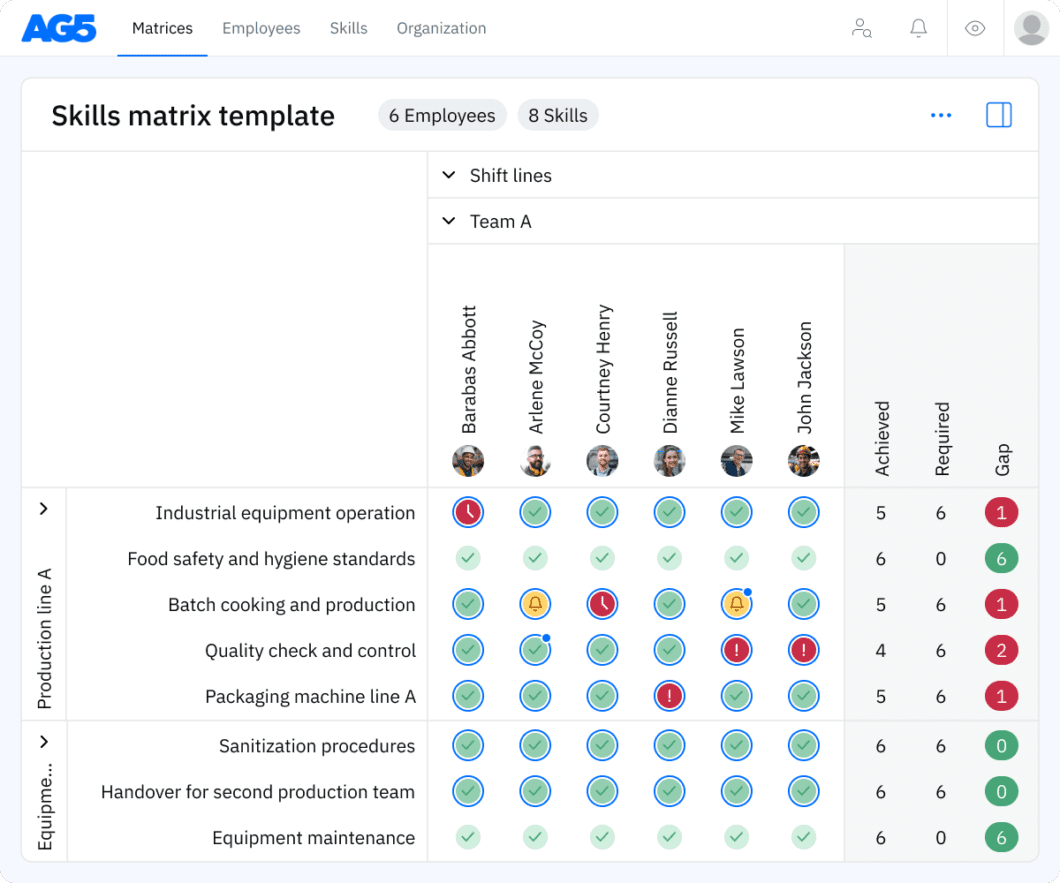Personal protective equipment (PPE) skills matrix template
A skills matrix template is a tool teams can use to effectively manage and assess their PPE skills and knowledge.
Download your free template here

Overview Copied
A skills matrix template is a tool that organizations can use to effectively manage and assess the skills and certification statuses of individual employees or teams.
With our free PPE skills matrix template, you will gain a comprehensive overview of the skills present within your organization and identify any skill gaps that may exist. By utilizing this information, you can develop and implement a strategic plan to ensure that your employees’ skills in personal protective equipment (PPE) are up-to-date, comprehensive, compliant, and ready for the future.
PPE Selection and Assessment
- Conducting hazard assessments to identify PPE requirements
- Selecting appropriate PPE based on job-specific risks (e.g., chemical exposure, fall hazards)
- Ensuring PPE meets relevant safety standards (e.g., ANSI, OSHA, CSA)
- Customizing PPE recommendations for various job roles
- Evaluating the effectiveness of selected PPE in reducing exposure to hazards
Hazard assessment and management
- Hazard identification and risk assessment procedures
- PPE selection based on hazard type
- Exposure control planning
- Incident reporting and analysis
- Certified Safety Professional (CSP)
PPE Maintenance and Storage
- Inspecting PPE for damage or wear before and after use
- Implementing proper cleaning and maintenance procedures for reusable PPE
- Managing storage and inventory of PPE supplies to prevent shortages
- Ensuring PPE is stored in a manner that maintains its integrity and effectiveness
- Keeping detailed maintenance records for reusable PPE (e.g., respirators, protective suits)
PPE Risk Management and Compliance
- Assessing risk of exposure to hazards and recommending appropriate PPE
- Conducting risk assessments to evaluate effectiveness of PPE in various conditions
- Implementing corrective actions for non-compliance or misuse of PPE
- Ensuring PPE use is aligned with hazard control measures (e.g., engineering controls, administrative controls)
- Tracking PPE-related incidents and near misses to improve safety protocols
- Collaborating with safety officers and occupational health personnel to address PPE concerns
Benefits Copied
Using a PPE skills matrix template can benefit your teams in various ways. Among them:
- Streamlined onboarding. By clearly outlining the competencies and certifications your employees need to handle specific PPE, you can streamline onboarding processes for new hires, ensuring they receive the training they need to work safely and effectively
- Proactive risk mitigation. You can proactively identify and address gaps in employees’ PPE knowledge and expertise, then fill them through targeted training recruitment, keeping your organization productive and safe
- Efficient resource management. With visibility into PPE expertise across different teams or departments, you can strategically allocate training resources, conduct refresher courses, and replenish PPE inventory when and if necessary
Download the free Excel Personal protective equipment (PPE) skills matrix template Copied
We also have a free Excel template available that you can download if you are not ready to get started with AG5. To download it, please complete this form here.
Frequently asked question Copied
-
What are the benefits of using a PPE skills matrix?
-
Is this PPE skills matrix free to download?
-
How do I use a PPE skills matrix?
-
What if I want to take my skills management to the next level?
Author Copied
Revisions Copied
Tired of managing skills in Excel?
Say goodbye to Excel matrices. Start using AG5’s plug and play skill matrix software.
Recognized by G2 for Excellence in Skills Management

